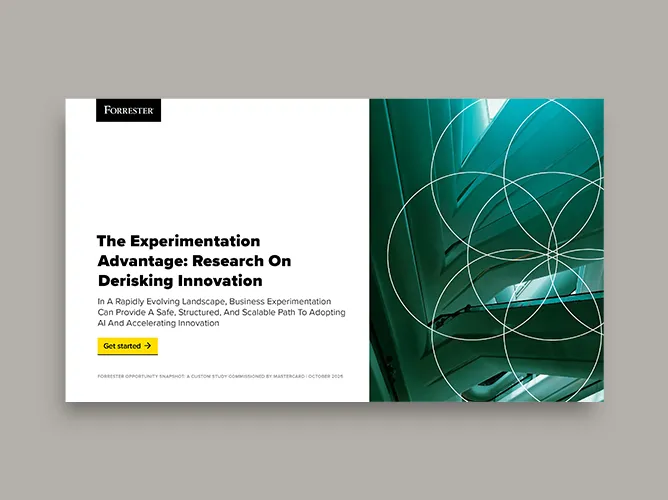By: Silvio Piserchia and Jo Ollier
Published: September 17, 2024 | Updated: October 29, 2025
Read time: 5 minutes
During 2014, a niche financial term started cropping up more commonly in online searches: fintech. It hit its peak in 2022, the same year it entered the Oxford English Dictionary.
The term is now so popular that it occurs as shorthand for the companies it describes : a “fintech” often being a fintech company.
Roughly a decade has passed since the term first started gaining mainstream currency. A check-in on progress seems timely. So, between December 2023 and January 2024, we commissioned interviews with senior-level executives from eight fintech companies and two fintech-focused venture capital firms in the UK and across the Americas.
The term is now so popular that it occurs as shorthand for the companies it describes
Their comments throw up a host of considerations for companies in the space. We address them from the perspective of four words often brought up in the context of fintech.
Disruptive?
Transformative might be a more fitting word. For all its early association with disruptive startups, fintech has empowered the establishment too.
Fintech companies now speak about embracing banking rather than disrupting it
Consumer-facing transformations attracted early attention as neobanks reinvented user experiences and customer experiences. But as one investor puts it today: “Incumbent banks have been so effective with the fast-follower model and closing the gaps on these putative experience advantages.”
The gap is not just closing from the incumbent side. Many fintech companies now speak about embracing banking rather than disrupting it: “That fintech refrain of ‘We don’t need to be a bank to disrupt banking’ … That’s partly true, of course, but it’s also true that lending has always been the most profitable portion of the banking business with a trillion-dollar revenue pool worldwide.”
Talk of “building out a full suite of products, largely comparable with a universal bank, across deposits, lending, insurance, wealth management” explicitly acknowledges the rapprochement. Access to a bank license can be decisive. It “gives you a million different ways to make money. And when you combine that with digital scale, you can multiply that even further.”
Niche?
Fintech startups generally began by appealing to untapped needs. Single-purpose value propositions for specific audiences attracted attention from underserved and unserved customers.
Personalization has paradoxically become a mass-market proposition
In some ways, that niche appeal has only intensified as fintech has progressed: “The BaaS market has not matured into a small group of entire bank as-a-service players but a multitude of providers specializing in ever small pieces of as-a-service.”
The irony is that BaaS is also creating a world where “everyone is a fintech.” And personalization has somewhat paradoxically become a mass-market proposition best handled by businesses with access to huge swaths of data. Niche can be attractive, but it can be equally restrictive: “Sure, there’s probably a gap in the market; I don’t think there’s market in the gap.”
As larger providers catch up with niche providers, customers may opt for the providers that offer more. Some providers now straddle B2C and B2B: “It’s a natural progression to offer something ‘direct to consumer’ as ‘proof of concept.’ And then when that works, go after true monetization with B2B.” Size helps with the bottom line in less obvious ways too: “We renegotiated all of our vendor relationships as we are a much bigger, valuable source of revenue to vendor partners than a few years ago.”
Profitable?
The early fintech years were all about building big enough customer bases. The approach still partly rings true: “A key issue on cost for any new entrant is customer acquisition and finding cheaper ways to get new customers ... We are constantly playing around the with variables on that, and influencer marketing has worked well for us.”
Some fintech companies still enjoy a certain luxury: “Our unit economics is good enough right now for us to be profitable, but that’s not our focus. We’re choosing to grow faster for at least probably a couple more years, instead of prioritizing profitability.” Yet, despite growing fintech profitability and some well-known successes, times have changed. Profit & loss (P&L) is now a common focus.
“We are certainly in a different market. Before, I think many investors had an open mind toward exactly how to monetize a given proposition. And firms were encouraged to address sources of friction and unmet need, confident revenue would eventually come. But now the focus is on having the product that will fund the service locked down on day one.” In other words, “prove the product is viable … before moving onto new products.”
Despite growing fintech profitability, times have changed
Instead of a sole focus on expansion, attention has shifted to two key areas. One is maximizing revenue by figuring out “the most profitable client relationships” and then “replicating those as part of new business activity.” The other is managing cost by removing underperforming products along with “any new product development that couldn’t be in market in under 12 months.”
Global?
A heightened focus on profitability has put the brakes on much unbridled growth. “We expanded very aggressively, entering many different markets concurrently through acquisition at the top of the market. But then we became over-extended and promptly exited all of those markets ... This was a massive retrenchment.”
On the other hand, the opportunity to serve unbanked and underbanked consumers offers a different perspective: “Our investors see clearly the fundamentals — the market is ripe for financial inclusion.”
Many small businesses are also ripe for inclusion. Still, sweeping continent-wide statements, such as “The next big opportunity for us in Africa. A lot of people see and understand that, and we’re looking at microfinancing,” tend to come with caveats: “There are a lot of local market idiosyncrasies we need to understand first.”
Local knowledge helps fintech companies expand “by partnering judiciously in local markets” to “scale more quickly.” Emerging technology helps too since “AI can make it cheaper and quicker to adjust products to local markets.”
Paytech, insurtech, regtech, martech … What the tech?
The answers to whether fintech is disruptive, niche, profitable or global may appear inconclusive. Yet it depends on context.
Fintech is as diverse as the providers offering it and is becoming increasingly inseparable from them. Despite the term’s inclusion in the Oxford English Dictionary, a follow-up fintech survey in 2034 may serve little purpose if the term is so deeply entrenched in financial services that it is bleached of all independent meaning.
Fintech’s influence has also spawned a host of related terms. Some, such as paytech and insurtech for payments and insurance, are closely connected to it. Others, such as regtech and martech for regulations and marketing, go beyond it. How many of them secure their own official dictionary entries remains to be seen.











